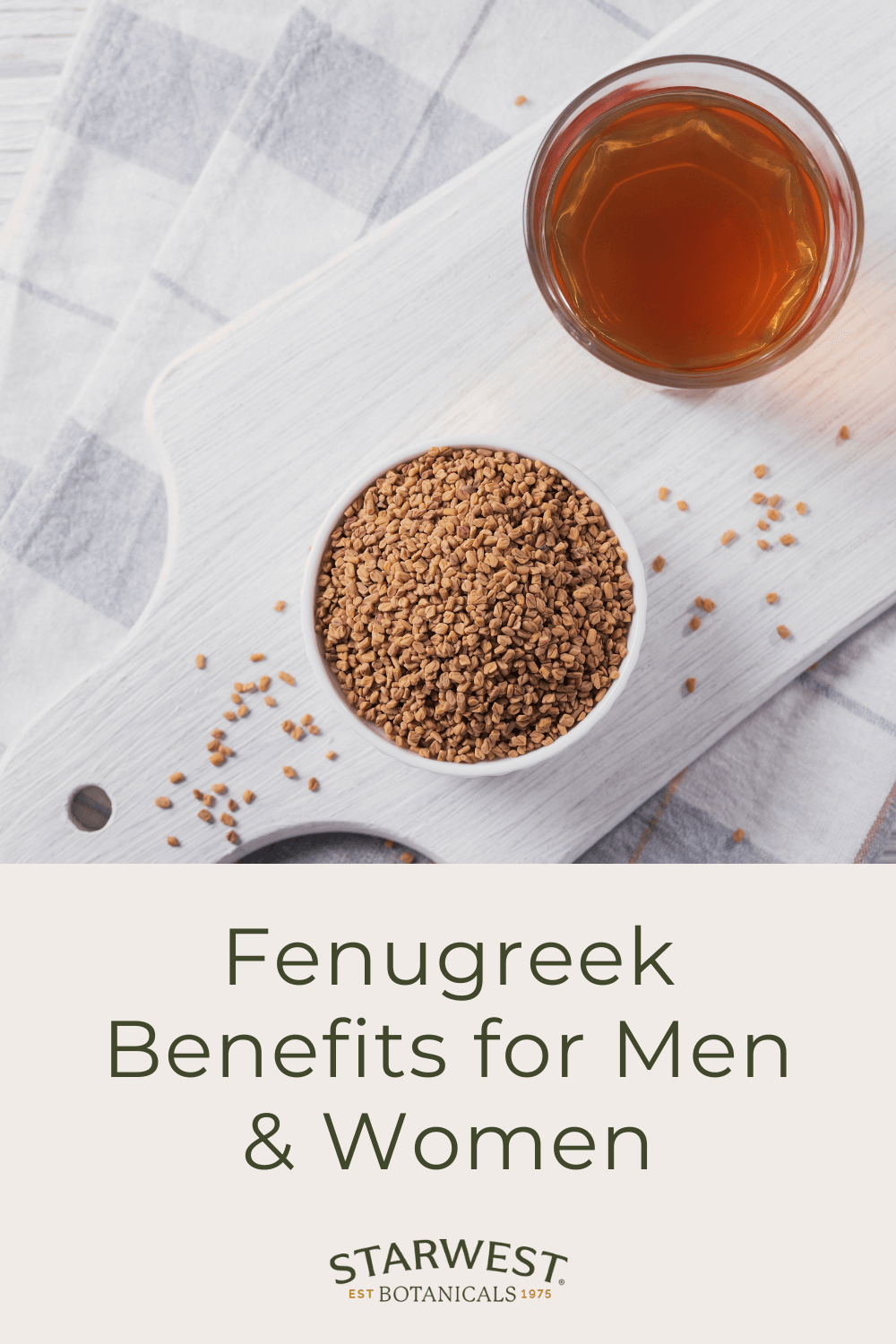Fenugreek Benefits for Men & Women | Starwest Botanicals
Posted by Molly McConnell on 03-04-2024

Fenugreek: A Seed of Many Wonders
Fenugreek is a pungent, fragrant seed commonly used in Ayurvedic cooking and remedies. With its heating nature, this spice may help kindle the digestive fire and may aid absorption. Fenugreek has also been used to support men’s and women’s wellness for thousands of years. This wonderous herb, referred to as methi is Sanskrit, has withstood the test of time over many centuries of case studies by the wise Ayurvedic vaidyas of ancient India. Ayurveda (the holistic healing science that originated in India more than 5,000 years ago) has long known that modern science is just recently catching on to: the fenugreek seed is packed with healing potential beneficial properties.
You will find fenugreek as a common remedy for a spectrum of men’s and women’s health challenges. Fenugreek has something for everyone. If you’re interested in accessing more stamina and stability, it may be worth giving this herb a try.
When it comes to weaving fenugreek in your life, you will most commonly find it in powdered form. The powder is the result of grinding up fenugreek seeds. The leaves from the fenugreek plant can also be cooked in place of any bitter green, though these may be more difficult to find than the whole seed or powdered form.
Not to be confused with fennel, a flowering plant from the carrot family, fenugreek is classified in the pea family (also called Fabaceae). Although the seeds of both are used, fennel is a more fibrous oval shape with a greenish color, while fenugreek seeds are golden or brown and almost look like small rocks with ragged edges. While both offer a sweet taste, they have many differences (though the two are often paired together in Ayurvedic cooking and teas). So, let’s dive in and focus on what makes fenugreek uniquely wonderful from the Ayurvedic Perspective.
The Ayurvedic Perspective on Fenugreek
The ancient Ayurvedic texts classify fenugreek as heating, with bitter, pungent and sweet tastes. These energetics make fenugreek particularly balancing for vata* and kapha doshas. Because of its heating nature, this herb can be aggravating for those with high pitta dosha conditions and should be avoided in bleeding disorders.
In Ayurvedic wisdom, fenugreek is believed to support circulatory health and reproductive health. It is also said to have the potential to support the digestive, respiratory and urinary systems.
*If the terms vata, pitta, and kapha are new to you, that’s ok! These are the three doshas, or functional principles of Ayurveda. They help us understand the qualities of our health challenges based on the wisdom of the elements (earth, water, fire, air and ether). People with vata energy embody more qualities of air and space (like creativity, adaptability and enthusiasm …but also anxiousness, restlessness and bloating). People with pitta embody more qualities of fire (like passion, discernment and focus …and also irritability, burnout and IBS). People with primary kapha energy embody more qualities of earth and water (like patience, generosity and calmness …but also sadness, brain fog and lethargy). To learn more about how vata, pitta and kapha are showing up in your body, take the Dosha Quiz.
Potential Benefits of Fenugreek for Men
When it comes to men’s health, fenugreek has the potential to deliver a series of uniquely potent benefits. According to a randomized, double-blind, placebo-controlled 2018 clinical study, fenugreek extract was found to support lean body mass.[1] Serum testosterone is related to sex drive, muscle mass and sperm production. Another study concluded that fenugreek extract had a “significant impact on both upper- and lower-body strength and body composition in comparison to placebo in a double-blind controlled trial,” with no clinical side effects.[2]
In addition to promoting strength and stamina in the male body, fenugreek may also help with hair health in men. For this purpose, it is best to use topically, in addition to taking internally. I recommend seeking out a high-quality fenugreek shampoo or hair oil. With its nutrient and protein content, fenugreek oil has been shown to be effective for nourishing the hair.[3] It may also help fight dandruff. If you’re up for an adventure, you can even make your own hair rinse by creating a fenugreek tea. (Check out 8 Fenugreek Remedies for Beauty and Body Care to learn how!)
Potential Benefits of Fenugreek for Women
Fortunately, the potential benefits of this spice are not limited to those with male bodies, fenugreek may help with hair health in women as well! Beyond that, it is featured in countless ancient beauty remedies for supporting radiant skin.
A 2022 study found that fenugreek extract may support collagen production.[4] Collagen is responsible for skin elasticity, in addition to healthy joints. As we age, vata dosha increases within us, bringing more dryness to the body — especially in the skin and joints. Excessive vata can accelerate the appearance of aging, which is why an herb like fenugreek is so wonderful for balancing vata and illuminating your natural radiance. If you’d like to explore making your own fenugreek beauty remedies, click here.
When it comes to women’s wellness, fenugreek may be most well-known for supporting breast milk flow in postpartum mothers. One study noted a 16% increase in milk production, concluding that fenugreek supplementation may “enhance milk production in the case of insufficient maternal milk production, due to maternal stress, difficulties in breastfeeding management, first parity, or when mothers are breastfeeding twins.” [5] Because fenugreek is also believed to cleanse the uterus, it is not recommended for pregnant women in large quantities (though culinary use is fine).
General Uses of Fenugreek
Beyond the specific benefits that fenugreek may offer to men and women, it is also believed to be generally beneficial to the nervous system and the digestive system. The ancient wisdom of Ayurveda classifies this spice as a rejuvenative tonic.
When it comes to potential impacts on the digestive system, Fenugreek is believed to aid metabolic challenges related to vata and kapha doshas. If you have a tendency toward gas and bloating after meals (vata-type indigestion) incorporating fenugreek into your meals may be helpful. With its heating properties, this multifaceted spice is said to counter the indigestion related to coldness in the body [6] (like bloating), while kindling digestive fire and aiding in the absorption of nutrients. Those with who struggle with sluggishness in the liver or diabetes may also benefit from the many gifts of fenugreek. [7]
Bio
Molly McConnell is a Certified Ayurvedic Practitioner who is committed to cultivating collective wellness. Guided by curiosity, embodied listening, and the rhythms of nature, Molly’s approach to Ayurveda is intentional and intersectional. As the cofounder ofCultivate Balance, she supports purpose-oriented people to come home to their bodies and restore resilience through nourishment, ritual, and routine. For a more immersive experience,Connect with Molly 1:1 or check outThe Reset for Resilience.

[1] Guo, Rui, et al. "Furosap, a novel Fenugreek seed extract improves lean body mass and serum testosterone in a randomized, placebo-controlled, double-blind clinical investigation." Functional Foods in Health and Disease 8.11 (2018): 519-530.
[2] Poole, Chris, et al. "The effects of a commercially available botanical supplement on strength, body composition, power output, and hormonal profiles in resistance-trained males." Journal of the International Society of Sports Nutrition 7.1 (2010): 1-9.
[3] Wasiullah, Md, et al. "A REVIEW ARTICLE ROLE ON COSMACEUTICAL OF HAIR GROWTH FENUGREEK AND ONION OIL." (2022).
[4]Eaknai, Waleewan, et al. "Ethanolic fenugreek extract: Its molecular mechanisms against skin aging and the enhanced functions by nanoencapsulation." Pharmaceuticals 15.2 (2022): 254.
[5] Sevrin, Thomas, et al. "Impact of fenugreek on milk production in rodent models of lactation challenge." Nutrients 11.11 (2019): 2571.
[6] Tirtha, Swami Sada Shiva. The Ayurveda Encyclopedia: Natural Secrets to Healing, Prevention & Longevity. Sat Yuga Press, 1998.
[7] Frawley, David and Dr. Vastant Lad. The Yoga of Herbs. Lotus Press, 1992.



